人教版(2019)选择性必修 第三册Unit 4 Adversity and Courage Discover useful structures 课件(共21张PPT)
文档属性
| 名称 | 人教版(2019)选择性必修 第三册Unit 4 Adversity and Courage Discover useful structures 课件(共21张PPT) |

|
|
| 格式 | pptx | ||
| 文件大小 | 9.2MB | ||
| 资源类型 | 教案 | ||
| 版本资源 | 人教版(2019) | ||
| 科目 | 英语 | ||
| 更新时间 | 2024-04-13 10:39:12 | ||
图片预览

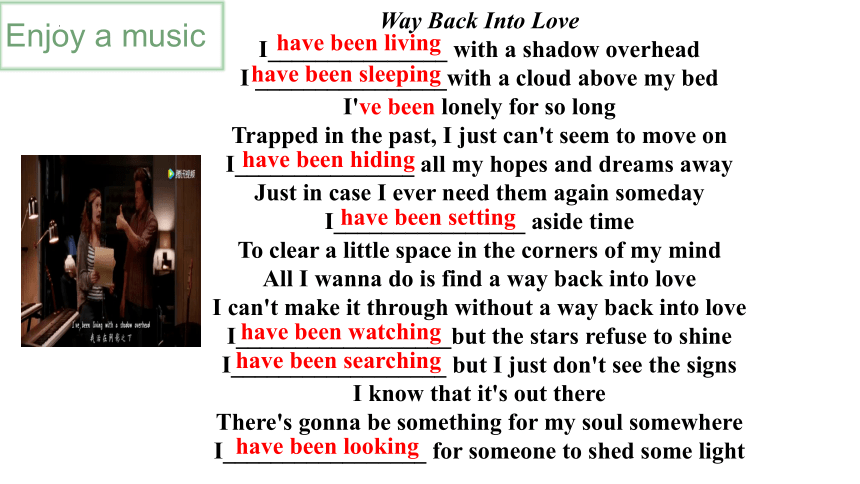
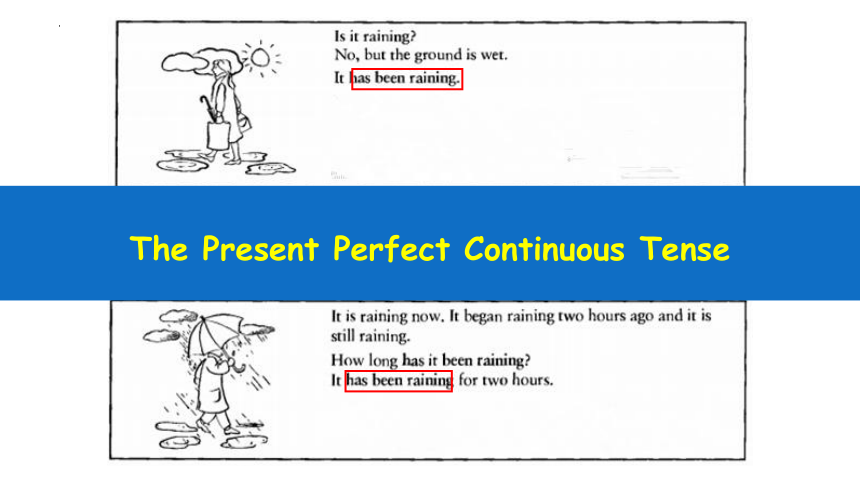
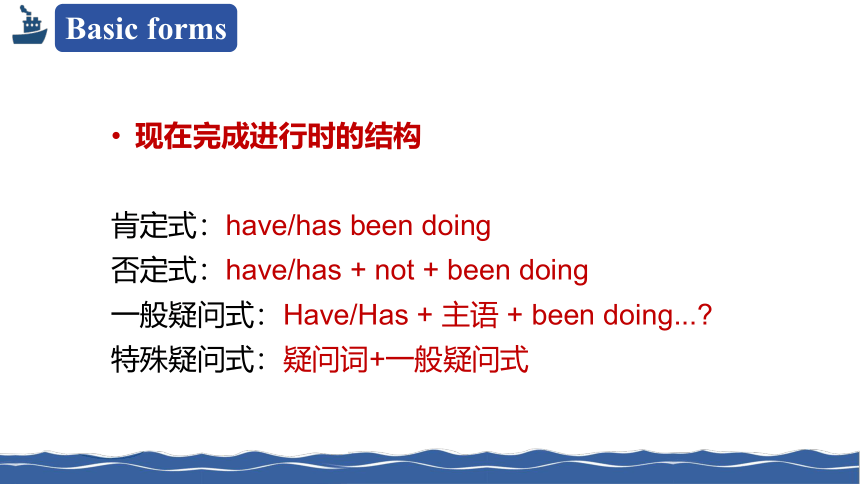
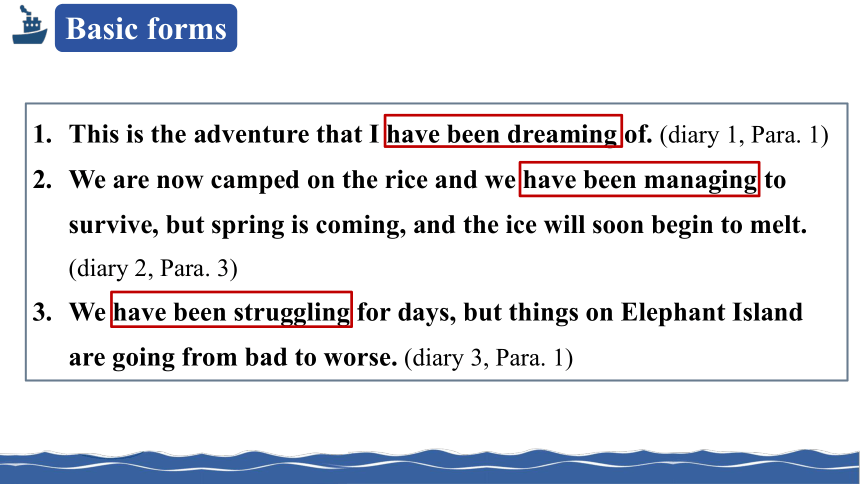
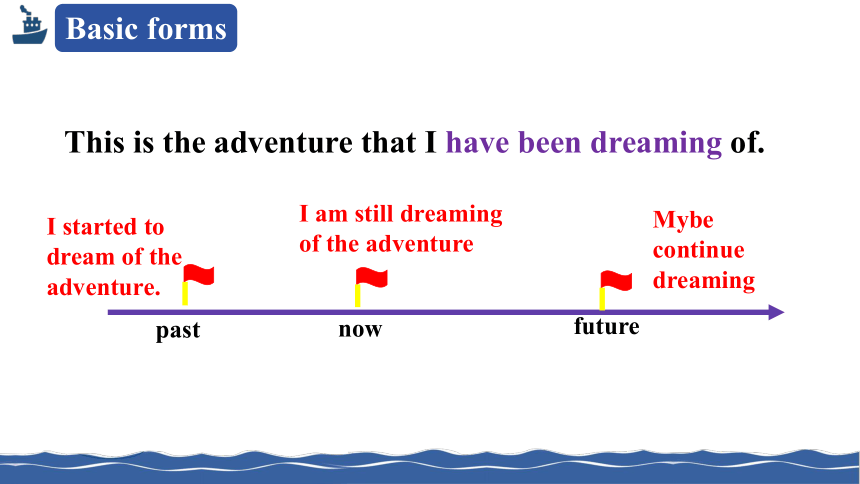
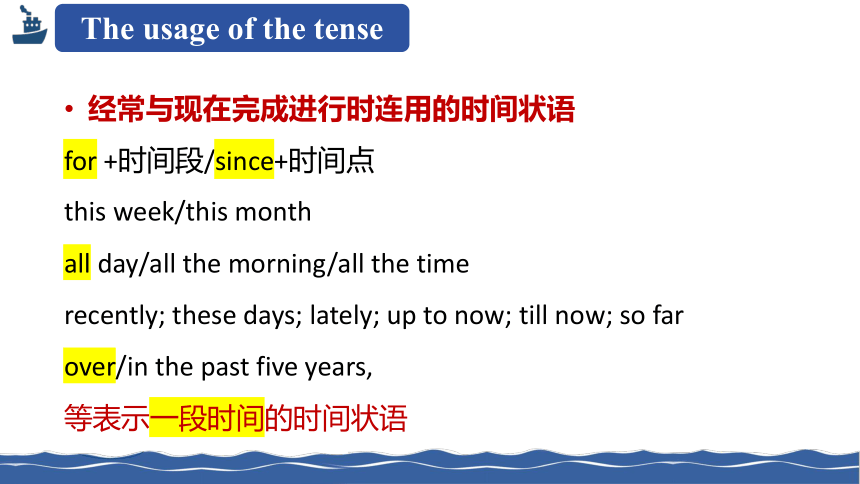
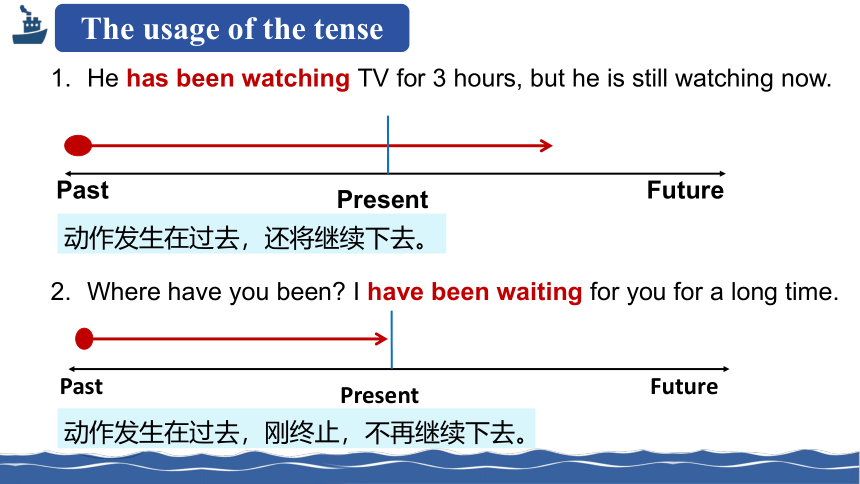
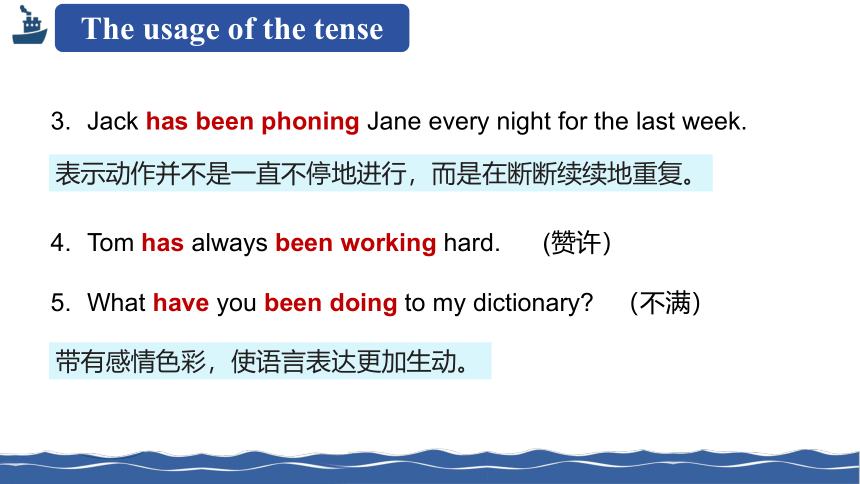
文档简介
(共21张PPT)
UNIT 4
ADVERSITY AND COURAGE
Discover useful structures
Way Back Into Love
I_______________ with a shadow overhead
I ________________with a cloud above my bed
I've been lonely for so long
Trapped in the past, I just can't seem to move on
I_______________ all my hopes and dreams away
Just in case I ever need them again someday
I________________ aside time
To clear a little space in the corners of my mind
All I wanna do is find a way back into love
I can't make it through without a way back into love
I__________________but the stars refuse to shine
I__________________ but I just don't see the signs
I know that it's out there
There's gonna be something for my soul somewhere
I_________________ for someone to shed some light
Enjoy a music
have been living
have been sleeping
have been hiding
have been setting
have been watching
have been searching
have been looking
The Present Perfect Continuous Tense
Basic forms
现在完成进行时的结构
肯定式:have/has been doing
否定式:have/has + not + been doing
一般疑问式:Have/Has + 主语 + been doing...
特殊疑问式:疑问词+一般疑问式
Basic forms
This is the adventure that I have been dreaming of. (diary 1, Para. 1)
We are now camped on the rice and we have been managing to survive, but spring is coming, and the ice will soon begin to melt. (diary 2, Para. 3)
We have been struggling for days, but things on Elephant Island are going from bad to worse. (diary 3, Para. 1)
Basic forms
This is the adventure that I have been dreaming of.
past
now
future
I started to dream of the adventure.
I am still dreaming of the adventure
Mybe continue dreaming
The usage of the tense
经常与现在完成进行时连用的时间状语
for +时间段/since+时间点
this week/this month
all day/all the morning/all the time
recently; these days; lately; up to now; till now; so far
over/in the past five years,
等表示一段时间的时间状语
The usage of the tense
He has been watching TV for 3 hours, but he is still watching now.
动作发生在过去,还将继续下去。
Present
Past
Future
Where have you been I have been waiting for you for a long time.
Present
Past
Future
动作发生在过去,刚终止,不再继续下去。
The usage of the tense
Jack has been phoning Jane every night for the last week.
Tom has always been working hard. (赞许)
What have you been doing to my dictionary (不满)
表示动作并不是一直不停地进行,而是在断断续续地重复。
带有感彩,使语言表达更加生动。
Compare and find
现在完成时与现在完成进行时
past
future
now
did
do
have done
past
future
now
did
do
have been doing
do
现在完成时
现在完成进行时
Watch & Answer
An adventure story:
In _____, _________________led a team to begin their expedition to __________.
How did the expedition begin
1914
Antarctica
Ernest Shackleton
Ernest Shackleton is a British explorer who is one of the giants of Antarctic exploration in the early years of the 20th Century.
Compare and find
现在完成时与现在完成进行时
He has been writing a novel, which will be finished next month.
He has written a novel, which is being prepared to come out now.
时态
现在完成时 强调完成和影响/结果
现在完成进行时 强调未完成和动作
Compare and find
现在完成时与现在完成进行时
Recently she has always been helping me.
Recently she has helped me a lot.
时态
现在完成时 强调完成和影响/结果 经常表单个事件
现在完成进行时 强调未完成和动作 可表重复事件
Compare and find
现在完成时与现在完成进行时
The repairman has been repairing the car all the afternoon.
The repairman has repaired your car, and you can have it now.
时态
现在完成时 强调完成和影响/结果 经常表单个事件 通常只陈述事实
现在完成进行时 强调未完成和动作 可表重复事件 含感彩
Compare and find
现在完成时与现在完成进行时
I have been visiting my hometown recently, and it impresses me differently each time.
I have visited my hometown recently, whose changes have left a deep impression on me.
时态 表重复时
现在完成时 强调完成和影响/结果 经常表单个事件 通常只陈述事实 强调成果,讲次数
现在完成进行时 强调未完成和动作 可表重复事件 含感彩 强调持续,不讲次数
Compare and find
状态动词:be, have, exist;
情感动词:like, love, hate;
感观动词:see, hear, know, feel, sound;
短暂性动词:finish, marry, get up, come, go等。
I have known him for years.
I have been knowing him for years.
They have finished the work.
They have been finishing the work.
有些动词不能用于现在完成进行时,但可用于现在完成时:
Summary
Dialogue
A:Hi, Peter, I haven’t seen you for months.
What have you been doing lately
B:Studying.
A:Studying what
B:Japanese.
A:Oh Really But I have never heard you practising it.
B:I have been studying Japanese for five years.
A:That’s great! Then you can be my interpreter
when I go to Japan.
B:No problem!
A:Oh! I almost forgot! I have a gift for you!
B:Thank you so much for this nice walkman.
I’ve been wanting it for a long time.
3.表示从过去某时开始持续到现在,但不再继续下去的事情。
1.表示“最近”一直在从事的工作或活动。
2.表示动作从过去某时开始一直持续到现在,并可能仍在继续的事情。
Dialogue
A:Where is Jane Is she out
B:No, she has been sitting in that room since 8’clock this morning.
A:What’s she doing
B:She has been thinking.
A:Thinking what
B:Which dress she should wear today.
4.表示动作从过去某时开始一直持续到现在(同2)。
高考对接
1. - You are a great swimmer. - Thanks. It's because I ___________________ (practise)a lot these days.
2. A retired engineer, 76-year-old Wilson ____________ (offer) free rides to college students for the past eight years.
3. Languages__________________________(come and go) for thousands of years, but in recent times there has been less coming and a lot more going.
4.People ________________ (pour) into stadiums since the days of ancient Greece.
has been offering
have been coming and going
have been practising
have been pouring
高考对接
5. For the biggest stadiums in the world, we _________ (use) data supplied by the World Atlas list so far, which ______ (rank) them by their stated permanent capacity, as well as updated information from official stadium websites.
6. ---Tony, why are your eyes red
---I _______________ (cut) up peppers for the last five minutes.
7. Since the time humankind started gardening, we ______________
(try) to make our environment more beautiful.
have used
ranks
have been cutting
have been trying
UNIT 4
ADVERSITY AND COURAGE
Discover useful structures
Way Back Into Love
I_______________ with a shadow overhead
I ________________with a cloud above my bed
I've been lonely for so long
Trapped in the past, I just can't seem to move on
I_______________ all my hopes and dreams away
Just in case I ever need them again someday
I________________ aside time
To clear a little space in the corners of my mind
All I wanna do is find a way back into love
I can't make it through without a way back into love
I__________________but the stars refuse to shine
I__________________ but I just don't see the signs
I know that it's out there
There's gonna be something for my soul somewhere
I_________________ for someone to shed some light
Enjoy a music
have been living
have been sleeping
have been hiding
have been setting
have been watching
have been searching
have been looking
The Present Perfect Continuous Tense
Basic forms
现在完成进行时的结构
肯定式:have/has been doing
否定式:have/has + not + been doing
一般疑问式:Have/Has + 主语 + been doing...
特殊疑问式:疑问词+一般疑问式
Basic forms
This is the adventure that I have been dreaming of. (diary 1, Para. 1)
We are now camped on the rice and we have been managing to survive, but spring is coming, and the ice will soon begin to melt. (diary 2, Para. 3)
We have been struggling for days, but things on Elephant Island are going from bad to worse. (diary 3, Para. 1)
Basic forms
This is the adventure that I have been dreaming of.
past
now
future
I started to dream of the adventure.
I am still dreaming of the adventure
Mybe continue dreaming
The usage of the tense
经常与现在完成进行时连用的时间状语
for +时间段/since+时间点
this week/this month
all day/all the morning/all the time
recently; these days; lately; up to now; till now; so far
over/in the past five years,
等表示一段时间的时间状语
The usage of the tense
He has been watching TV for 3 hours, but he is still watching now.
动作发生在过去,还将继续下去。
Present
Past
Future
Where have you been I have been waiting for you for a long time.
Present
Past
Future
动作发生在过去,刚终止,不再继续下去。
The usage of the tense
Jack has been phoning Jane every night for the last week.
Tom has always been working hard. (赞许)
What have you been doing to my dictionary (不满)
表示动作并不是一直不停地进行,而是在断断续续地重复。
带有感彩,使语言表达更加生动。
Compare and find
现在完成时与现在完成进行时
past
future
now
did
do
have done
past
future
now
did
do
have been doing
do
现在完成时
现在完成进行时
Watch & Answer
An adventure story:
In _____, _________________led a team to begin their expedition to __________.
How did the expedition begin
1914
Antarctica
Ernest Shackleton
Ernest Shackleton is a British explorer who is one of the giants of Antarctic exploration in the early years of the 20th Century.
Compare and find
现在完成时与现在完成进行时
He has been writing a novel, which will be finished next month.
He has written a novel, which is being prepared to come out now.
时态
现在完成时 强调完成和影响/结果
现在完成进行时 强调未完成和动作
Compare and find
现在完成时与现在完成进行时
Recently she has always been helping me.
Recently she has helped me a lot.
时态
现在完成时 强调完成和影响/结果 经常表单个事件
现在完成进行时 强调未完成和动作 可表重复事件
Compare and find
现在完成时与现在完成进行时
The repairman has been repairing the car all the afternoon.
The repairman has repaired your car, and you can have it now.
时态
现在完成时 强调完成和影响/结果 经常表单个事件 通常只陈述事实
现在完成进行时 强调未完成和动作 可表重复事件 含感彩
Compare and find
现在完成时与现在完成进行时
I have been visiting my hometown recently, and it impresses me differently each time.
I have visited my hometown recently, whose changes have left a deep impression on me.
时态 表重复时
现在完成时 强调完成和影响/结果 经常表单个事件 通常只陈述事实 强调成果,讲次数
现在完成进行时 强调未完成和动作 可表重复事件 含感彩 强调持续,不讲次数
Compare and find
状态动词:be, have, exist;
情感动词:like, love, hate;
感观动词:see, hear, know, feel, sound;
短暂性动词:finish, marry, get up, come, go等。
I have known him for years.
I have been knowing him for years.
They have finished the work.
They have been finishing the work.
有些动词不能用于现在完成进行时,但可用于现在完成时:
Summary
Dialogue
A:Hi, Peter, I haven’t seen you for months.
What have you been doing lately
B:Studying.
A:Studying what
B:Japanese.
A:Oh Really But I have never heard you practising it.
B:I have been studying Japanese for five years.
A:That’s great! Then you can be my interpreter
when I go to Japan.
B:No problem!
A:Oh! I almost forgot! I have a gift for you!
B:Thank you so much for this nice walkman.
I’ve been wanting it for a long time.
3.表示从过去某时开始持续到现在,但不再继续下去的事情。
1.表示“最近”一直在从事的工作或活动。
2.表示动作从过去某时开始一直持续到现在,并可能仍在继续的事情。
Dialogue
A:Where is Jane Is she out
B:No, she has been sitting in that room since 8’clock this morning.
A:What’s she doing
B:She has been thinking.
A:Thinking what
B:Which dress she should wear today.
4.表示动作从过去某时开始一直持续到现在(同2)。
高考对接
1. - You are a great swimmer. - Thanks. It's because I ___________________ (practise)a lot these days.
2. A retired engineer, 76-year-old Wilson ____________ (offer) free rides to college students for the past eight years.
3. Languages__________________________(come and go) for thousands of years, but in recent times there has been less coming and a lot more going.
4.People ________________ (pour) into stadiums since the days of ancient Greece.
has been offering
have been coming and going
have been practising
have been pouring
高考对接
5. For the biggest stadiums in the world, we _________ (use) data supplied by the World Atlas list so far, which ______ (rank) them by their stated permanent capacity, as well as updated information from official stadium websites.
6. ---Tony, why are your eyes red
---I _______________ (cut) up peppers for the last five minutes.
7. Since the time humankind started gardening, we ______________
(try) to make our environment more beautiful.
have used
ranks
have been cutting
have been trying
